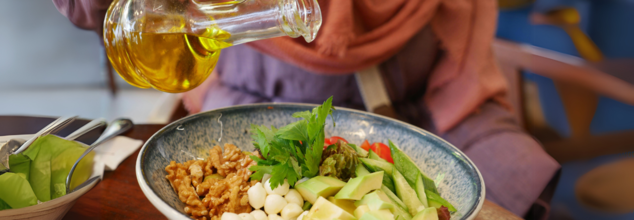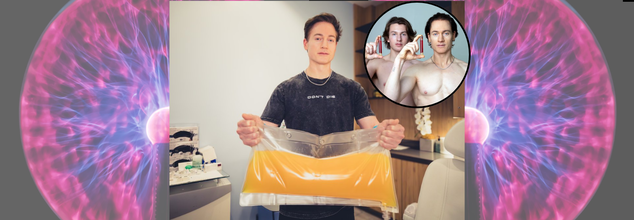- Health Conditions A-Z
- Health & Wellness
- Nutrition
- Fitness
- Health News
- Ayurveda
- Videos
- Medicine A-Z
- Parenting
- Web Stories
National Ayurveda Day 2024: Relevance Of Traditional Medicine

Credits: Canva
The National Ayurveda Day celebrated every year since 2016 and this year this coincides with Dhanwantari Jayanti (Dhanteras). Dhanwantari is the physician of the devas in Hinduism and is also considered an avatar of Vishnu. He finds his mentions in Puranas as the god of Ayurveda. Ayurveda is perceived as one of the most ancient and well-documented systems of medicine equally relevant in modern times.
This year marks the 9th Ayurveda Day, and to mark this day, Prime Minister Narendra Modi will launch, inaugurate and lay the foundation stone of multiple projects related to the health sector worth INR 12,850 crore, today.
Origins Of Ayurveda
It has a long history and may have originated as much as 3,000 years ago. Today, it remains relevant and is a favoured form of health care in large parts of the Eastern world, especially in India. The Indian Medical Council, set up in 1971 also establishes suitable qualifications in Indian medicine and recognises the various forms of practices in traditional medicines, including Ayurveda.
The Vedas, a rich source of Hindu mythology and practices also note of the practice of Ayurveda, which has many practices for the treatment of diseases. The major diseases mentioned are fever (takman), cough, consumption, diarrhoea, dropsy, abscesses, seizures, tumours, and skin diseases. The herbs are prescribed for these diseases.
Relevance Of Ayurveda, Today
Dr Rini Vohra, a PhD, Scientific Advisor at Maharishi Ayurveda says, "Ayurveda is not just an ancient system but a science of life that remains deeply relevant in modern preventive and curative healthcare. Ayurveda’s principles are built on the idea of the body's inner intelligence and bringing out a balance— in your doshas, Agni, Dhatus (tissues), Elimination, Mind, Senses and the Atma."
Ayurveda is also relevant today as it helps cope up with the ever-evolving and speedy world. It combats lifestyle diseases, helps with stress, anxiety and fatigue.
"Ayurveda offers powerful, yet time-tested solutions. Simple daily practices, like following an Ayurvedic Dosha-based Dinacharya (daily routine) and Ritucharya (seasonal routines), helps individuals maintain a physical and mental harmony with nature, while Ayurvedic herbs and remedies strengthen immunity and overall wellness," notes Vohra.
Ayurveda is distinct from other fields of medicinal practice, because it finds out the root cause and then provides a solution, rather than just treating the symptoms. "As we continue to evolve our understanding of healthcare, Ayurveda serves as both a preventive and curative force that is as relevant today as it was thousands of years ago," notes Vohra.
Benefits Of Ayurveda
As per the Ministry of Ayush, the following are the benefits of Ayurveda:
- Reduces Stress And Anxiety
- Boosts Immune System using natural herbs like ashwagandha, turmeric, and ginger
- Promotes Digestion with the blend of Ayurvedic remedies like triphala and ginger
- Improves Skin Health
- Enhances Brain Functions, especially herbs like Brahmi
- Supports Heart Health
- Improves Sleep Quality
A Spoonful Of THIS In Your Daily Meals Can Lower Your Risk Of Dementia

(Credit-Canva)
Affecting millions of people throughout the globe, dementia is the seventh leading cause of death. There are many different variations of the condition, Alzheimer’s being the most common. In 2021, according to the World Health Organization, 57 million people were affected worldwide.
When it comes to what factors affect the risk of dementia, your dietary intake is first in line to change. What you eat can increase or decrease the chance of you getting dementia.
Researchers have found that something as simple as adding a spoonful of olive oil to your meals each day could have a big impact on your health, potentially lowering your chances of dying from dementia. This research suggests that this common cooking oil might have protective properties for the brain, in addition to its well-known benefits for the heart, making it a potentially life-saving habit to incorporate into your daily routine.
Dietary Habits and Dementia Deaths
Published in the JAMA Network Open by the Nutrition, Obesity, and Exercise 2024, this study specifically examined how individual foods within that diet relate to death rates associated with dementia. Ther researchers looked at the eating habits of a large group of adults and tracking how many of them eventually died from dementia. This long-term study allowed them to see if there were any connections between specific foods people ate regularly and their risk of dying from this brain condition. While past studies hinted that the Mediterranean diet might be good for the brain, this research specifically focused on how individual foods within that diet, like olive oil, were linked to dementia-related deaths.
Long Term Track of Olive Oil Intake
A dedicated team of researchers from a well-known health school in the United States followed the diets of more than 92,000 adults for nearly 30 years. All of these people reported eating at least a small amount of olive oil, about half a tablespoon, every day as part of their regular meals. By following such a large group over a long period, the researchers were able to gather a lot of information about the potential long-term effects of olive oil consumption on their health, particularly in relation to dementia.
The results of this long-term study were quite striking. They found that the people who regularly made olive oil a part of their daily diet had a significantly lower chance – about 28% lower – of dying from dementia compared to those who didn't use olive oil often or at all. This suggests that consistently including even a small amount of this oil in your meals could offer a considerable level of protection against this devastating brain condition.
Replacing Unhealthy Fats with Olive Oil
Experts pointed out that their findings support the advice to use vegetable oils like olive oil in our diets. She suggested that this recommendation might be important not only for keeping our hearts healthy but also for potentially keeping our brains healthy as we age. She also noted that choosing olive oil, which is a natural product, instead of less healthy fats like margarine and the mayonnaise you buy in stores, could be a safe way to reduce the risk of dying from dementia.
Understanding Risk Factors Of Dementia
While the study found a clear link between eating olive oil and a lower risk of dementia death, experts are still looking to understand the disease more. They have identified several things that can make a person more likely to develop the condition. While some of these risk factors, like how old you are and your genes, are things you can't change, others are related to your lifestyle choices.
Health experts recommend several lifestyle changes that may help reduce the risk of developing dementia. These include eating a well-balanced diet rich in fruits, vegetables, and healthy fats like olive oil, maintaining a healthy body weight, engaging in regular physical activity, limiting alcohol consumption, quitting smoking, keeping your blood pressure at a healthy level, and staying socially active and connected with others
Can Dehydration Affect Your Eye Sight?

(Credit-Canva)
While we all know that water is the essence of life, without which we cannot survive, many of us neglect our water intake, only drinking it when we are parched. While you may not know this, hydration helps keep our body parts lubricated and functioning properly, like our eyes. One needs adequate water intake to keep our water eyes moist. According to the eye foundation, hydration helps us form tears, keep our eyes hydrated and free of infections, it also helps clearing toxins from the body as well as carry essential vitamins and minerals throughout our body.
However, a recent report has revealed a significant problem in the UK, many people don't know how their diet affects the health of their eyes. the study highlighted the lack of understanding that people have about the vital role hydration, vitamins and minerals that we need to survive. It means that people might not be making the right food choices to keep their eyes healthy in the long run, potentially leading to vision problems later in life that could have been avoided with better nutritional knowledge.
The study, called 'SEEING SENSE: The Nation's Eye Health Knowledge And The Impact Of Diet,' was put together by MacuShield, a company that makes supplements for eye health. The name of the report itself suggests that there's a need for more common sense and understanding when it comes to looking after our eyes through what we eat.
Survey Revealed The Lack of Understanding People Have About Vision And Diet
Experts expressed concern that less than half of British people feel they know how to support their eye health through diet. She also highlighted how crucial it is to drink enough water, not just for overall health, but specifically for good eyesight. Dehydration can lead to uncomfortable issues like dry eyes and even affect how clearly we see, so encouraging people to drink enough fluids is a key message from the report.
It also showed that many people in the UK don't know which specific vitamins and minerals are good for keeping their eyes healthy, nor do they know which foods contain these important nutrients. Adding to this issue, government statistics show that most people in the country aren't eating the recommended five portions of fruits and vegetables every day, meaning they are likely missing out on key nutrients that support good vision.
Dehydration Can Affect Vision
The report emphasizes that not drinking enough water can cause direct problems for our eyes, such as making them feel dry, giving us headaches, and even blurring our vision. What makes this even more concerning is that the study found that people in the UK are actually drinking less water now compared to before. This worrying trend in lower water consumption only makes the risk of these dehydration-related eye issues even greater for the population.
The latest data from MacuShield shows a troubling drop in water intake, with fewer people drinking the recommended amounts and a significant portion consuming very little water daily, highlighting a real need for increased awareness about hydration.
How Much Water Should We Drink?
Experts on the study recommended women and older girls to drink about two liters of water each day, while men and older boys should aim for around 2.5 liters to help keep their eyes properly lubricated and generally healthy.
Biohacker Bryan Johnson Swaps Out His Plasma To Reverse Aging; How Does It Work?

With new longevity science and health experiments, there is one individual at the forefront, Bryan Johnson, a tech billionaire-biohacker with a passion for reversing the clock. Renowned for spending more than $2 million a year on his own personal anti-aging routine, Johnson has pushed his crusade to new limits by having total plasma exchange (TPE)—a scientifically fascinating but highly controversial treatment that replaces the body's plasma with a substitute solution in an attempt to purify the body and, in Johnson's desire, reverse the clock.
Johnson, 47, was formerly in the headlines for injecting himself with his teenage son's plasma as part of what he called a "multi-generational plasma exchange." This was captured during the Netflix special Don't Die, which followed his extensive anti-aging trials, including plasma swapping with his father and son.
But as Johnson recently posted on social media, he has since switched from that headline-making habit. "I didn't give up because injecting your child's blood is creepy. I gave up because there's something that works better," Johnson tweeted.
That "something" is total plasma exchange (TPE)—a clinical-level process commonly compared to an "oil change" for the human body.
What Is Total Plasma Exchange?
Also referred to as therapeutic plasma exchange, or plasmapheresis, TPE is a procedure where the blood from a patient is taken out, broken down into its components (red cells, white cells, platelets, and plasma), and then the plasma is removed and replaced with a replacement fluid like albumin or donor plasma. The replacement fluid and the blood cells are then injected back into the body of the patient.
Having been used in hospitals for decades, TPE is already approved for conditions such as Guillain-Barré syndrome, myasthenia gravis, lupus, vasculitis, and even long COVID. New research now suggests that it has the potential to contribute to anti-aging, mental clarity, and immune system restoration—a path Bryan Johnson is heavily invested in.
What Happens When The Plasma Is Removed From Your Body?
Johnson's TPE treatment, as described by him, is to take out all his plasma and put in a 5% albumin solution and IVIG (intravenous immunoglobulin)—an extremely potent antibody-infused fluid usually reserved for bolstering or modulating immune function in immunocompromised individuals.
His treatment follows a bi-weekly routine involving two plasma exchange sessions, and then IVIG infusions that are four days apart. For each session, Johnson's team takes extensive baseline measurements, ranging from toxin concentrations to organ age to even microplastic levels.
In an interesting twist, Johnson asserts that his plasma was so exceptionally pure—presumably because of his stringent vegan diet, sleep habits, and supplement protocol—that the medical technician running the TPE machine "couldn't bring himself to throw it away."
What Is Albumin?
Albumin is the most prevalent protein found in human blood plasma. It has a primary function in tissue repair, transportation of nutrients, and fluid regulation. In TPE, it's the primary replacement fluid because it's compatible with human physiology and has a supporting role to preserve normal body functions after plasma removal.
Johnson feels that substituting his plasma with albumin provides a more efficient way of removing "unnatural pollutants" from the body—something that he believes is crucial in lowering biological age and avoiding age-related disease.
How Plasma Exchange Fights Aging?
The theoretical attraction of plasma exchange among longevity communities is that it has the ability to eliminate pro-inflammatory factors, toxic proteins, and defective antibodies that accrue over aging. Mice studies have established that the elimination of old plasma can trigger rejuvenation of organs and improved cognitive function—inspiring hopes for the same in humans.
According to proponents, removing plasma and replacing it can:
- Reduce systemic inflammation
- Enhance metabolic function
- Increase energy and mental acuity
- Boost immune system strength
While the area has not yet seen large-scale human studies, preliminary data and anecdotal results, like those of Johnson, are fueling increasing interest in TPE as a research anti-aging intervention.
TPE isn't for the faint of wallet. The cost of each session ranges from $5,000 to $10,000, and insurance usually doesn't cover the treatment unless it's for a condition approved by their organization. Johnson, who cashed out his payment firm Braintree to PayPal for $800 million, can finance his curiosity—and he's doing it on a very public platform.
Side Effects and Risks of Plasma Exchange
As with any surgical procedure, TPE has its own risks and side effects, which include:
- Fatigue and nausea
- Tingling of the hands, feet, or lips
- Risk of low blood pressure, low calcium, or anemia
- Occasional complications such as bleeding, infection, or syncope
Because it is a complex procedure, it needs experienced professionals and sterile equipment—the procedure is usually done in specialized hospitals or clinics.
How Does It Add To Longevity?
While Bryan Johnson’s approach might seem extreme to some, it’s pushing the boundaries of what modern medicine knows about aging and regeneration. Whether plasma exchange will emerge as a validated fountain of youth or remain a fringe biohacking trend remains to be seen.
Johnson, though, is convinced the proof is "emergent" and that his protocol could revolutionize our conception of aging. "I now have a birthday every 19 months," he asserts, quoting a deceleration of his biological aging rate to only 0.64, based on measurements taken by his team.
Johnson’s journey—from son-to-father blood swaps to high-tech plasma exchange—may seem eccentric, even controversial. But it shines a spotlight on a fundamental question facing medicine and humanity alike: What if aging isn’t inevitable?
His approach may not yet be mainstream or universally accepted, but it's certainly forcing a larger conversation about the future of personalized medicine, regenerative therapies, and how far we’re willing to go in pursuit of youth.
© 2024 Bennett, Coleman & Company Limited

